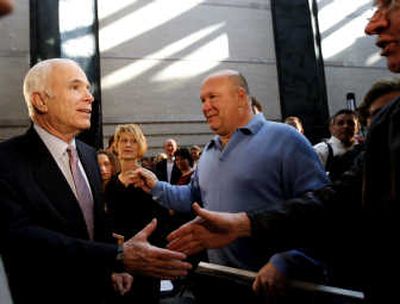McCain defends his tanker inquiries

WASHINGTON – Sen. John McCain said Tuesday his inquiries into a $35 billion Air Force tanker contract were designed to assure evenhanded bidding and denied they were motivated by lobbyists who are close advisers to his presidential campaign.
“I had nothing to do with the contract, except to insist in writing, on several occasions, as this process went forward, that it be fair and open and transparent,” he said at a meeting with voters in St. Louis. “That was my involvement in it.”
His remarks came after the Associated Press reported that some of his current advisers lobbied last year for the European Aeronautic Defence and Space Co., the parent company of plane maker Airbus. EADS and its U.S. partner Northrop Grumman Corp. beat out Boeing Co. for the lucrative aerial refueling contract.
Boeing on Tuesday filed a formal protest of the tanker award with the Government Accountability Office, citing “irregularities” in the contract competition.
Two of the lobbyists working on the EADS account gave up their lobbying work when they joined McCain’s campaign last year. A third, former Texas Rep. Tom Loeffler, lobbies for EADS and serves as McCain’s national finance chairman.
McCain, the Republican presidential nominee in waiting, has been instrumental in the Pentagon’s long attempt to complete a deal on the tanker. McCain helped block an earlier, scandal-marred tanker contract with Boeing in 2004 and prodded the Pentagon in 2006 to change proposed bidding procedures opposed by Airbus.
EADS retained the Loeffler Group to lobby for the tanker deal last year, months after McCain sent two letters urging the Defense Department to make sure the bidding proposals guaranteed competition between Boeing and Airbus.
“They never lobbied him related to the issues, and the letters went out before they were contracted” by EADS, McCain campaign spokeswoman Jill Hazelbaker said.
According to lobbying records filed with the Senate, Loeffler Group lobbyists on the project included Loeffler; Susan Nelson, who left the firm and is now the campaign’s finance director, and former Secretary of the Navy William Ball III, who has campaigned for McCain. EADS also had a long-term relationship with Ogilvy Government Relations, formerly known as the Federalist Group.
Ogilvy lobbyist John Green, who records show worked on the EADS account, recently took a leave of absence to volunteer for McCain as the campaign’s congressional liaison.
Danielle Brian, executive director of the Project On Government Oversight, a watchdog group that has cooperated with McCain in the past on the tanker issue, said she had seen no evidence that lobbyists influenced McCain’s stands on the bidding process. But she said he is judged differently because of his reputation as a self-described “straight-talking” reformer.
“McCain ends up having to live by a higher standard than everyone else because he’s the one that’s been pointing out how corrupt the whole Washington system is,” she said. “And when he doesn’t, he does hand his critics ammunition.”
McCain on Tuesday said his work on the tanker was designed to keep the bidding competitive.
“I think my record is very clear on this issue, including a paper trail of letters that we wrote to the Department of Defense during this process and saying clearly and unequivocally we just want a fair process, and we don’t want a repeat of the previous process,” he told reporters in St. Louis. McCain is a longtime critic of influence peddling and special interest politics. But he has come under increased scrutiny as a presidential candidate, particularly because he has surrounded himself with advisers who are veteran Washington lobbyists. He has defended his inner circle and has emphatically denied reports last month in the New York Times and the Washington Post that suggested he helped the client of a lobbyist friend nine years ago.
A Boeing spokesman declined to comment on the links between McCain and lobbying efforts on behalf of EADS. Loeffler did not respond to phone and e-mail messages.
But Boeing supporters, particularly in Washington state where Boeing would have performed much of the tanker work, already have begun to accuse McCain of damaging Boeing’s chances by inserting himself into the tanker deal.
Rep. Norm Dicks, D-Wash., said the field was “tilted to Airbus” because the Pentagon did not weigh European subsidies for Airbus in its deliberations – a decision he blamed on McCain.